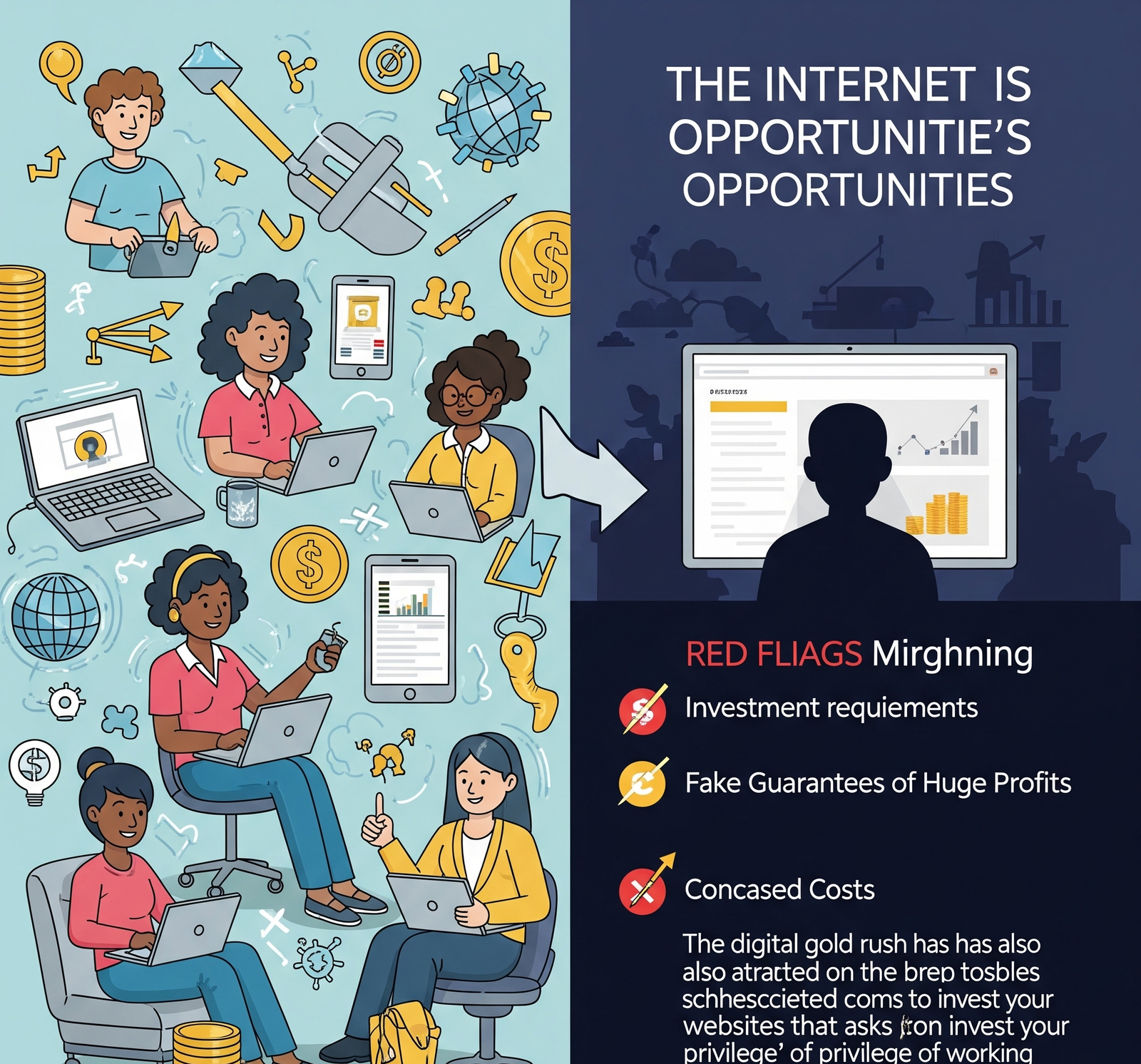The internet is brimming with opportunities. From freelance gigs to remote work, the promise of earning a living from the comfort of your home has never been more attainable. However, this digital gold rush has also attracted a new breed of sophisticated scams: platforms, apps, and websites that ask you to invest your own money for the “privilege” of working or earning.
The pitch is often enticing: “Invest a small amount to unlock higher-paying tasks,” or “Purchase a VIP level to get exclusive access to premium work.” It sounds like a simple investment in your earning potential. In reality, it’s a critical red flag signaling a dangerous trap. Here’s a detailed look at why you should never work with any app or site that asks for an investment to earn.
Legitimate Work Doesn’t Cost You Money
Let’s start with the most fundamental principle of employment: You work for them, they pay you. Not the other way around. A legitimate employer will never ask you to pay for the job itself, for training, or for access to the tools needed to perform your duties.
Think about any traditional job. Does a company ask you to pay a fee before they hire you as an accountant, a cashier, or a project manager? Of course not. They invest in you because they expect a return from the value your work provides. The moment an online “opportunity” inverts this model, you should be on high alert. Asking for an investment is the clearest sign that the business model is not based on legitimate work, but on taking money from its “workers.”
The Anatomy of the Investment-for-Work Scam
These scams are often cleverly designed to look like genuine opportunities. They might call it a “membership fee,” an “activation deposit,” a “starter kit,” or a “portfolio fee.” Here’s how the trap usually unfolds:
- The Initial Lure: You’re promised easy tasks—like watching videos, liking social media posts, or writing simple reviews—with unbelievably high returns.
- The Small, Early Payout: To build trust, the platform may allow you to complete a few initial tasks and withdraw a small amount of money successfully. This “proves” the system works and encourages you to invest more.
- The Investment Ladder: To “earn” more, you’re pushed to invest money to “upgrade” your account. Higher investment levels promise access to more tasks and better pay. This is where the real scam begins.
- The Vanishing Act: Once a significant amount of money has been “invested,” the platform either disappears overnight, or your account is suddenly frozen for a bogus reason. The tasks dry up, withdrawal requests are denied, and customer support goes silent. The money you put in is gone forever.
This model is not employment; it’s a classic Ponzi or pyramid scheme, where the money from new “investors” is used to pay the early ones, creating a false impression of profitability before the entire structure collapses.
Beyond Financial Loss: The Hidden Dangers
The consequences of falling for these schemes extend far beyond the initial investment.
- Data Theft: To sign up, you often have to provide sensitive personal information, including your full name, phone number, and sometimes even bank account details. This data can be sold on the dark web or used for identity theft.
- Psychological Manipulation: These platforms are masters of psychological manipulation. They exploit the human desire for easy money and financial freedom, creating a sense of urgency and a fear of missing out (FOMO). Victims often report feeling embarrassed and ashamed, which can prevent them from reporting the crime.
- Wasted Time and Effort: Beyond the money lost, think of the hours you spend completing meaningless tasks under the false belief that you are building an income stream. This is valuable time that could have been spent on legitimate, skill-building opportunities.
Red Flags: How to Spot a Pay-to-Work Scam
Protect yourself by learning to recognize the warning signs:
- Any Request for Investment: This is the biggest and most obvious red flag. Legitimate employers pay you; you don’t pay them.
- Guarantees of High Returns for Low-Skill Work: If it sounds too good to be true, it almost certainly is. Real work requires real effort, and the pay is proportional to the skill and value provided.
- Vague Job Descriptions: Scammers are often vague about the actual work you’ll be doing. They focus on the potential earnings rather than the job duties.
- Pressure to Act Quickly: You might be told that “spots are limited” or that an “offer is expiring soon.” This is a tactic to rush you into making a decision without thinking it through.
- Unprofessional Communication: Look for grammatical errors, spelling mistakes, and generic email addresses (like Gmail or Hotmail) for official communication.
The Bottom Line: Your Skills Are the Real Investment
Instead of paying to work, invest in yourself. Use your time to learn a new, marketable skill like graphic design, digital marketing, coding, or content writing. There are countless legitimate freelance platforms and job boards where you can offer your skills and get paid a fair wage without ever having to pay a fee.
The dream of a quick and effortless income is a powerful one, but any platform that asks for your money in exchange for the chance to earn more is not an opportunity—it’s a trap. Value your time, protect your money, and remember the golden rule: you are the one who should be getting paid.
Disclaimer
This article provides general information and warnings about online scams. It is intended for educational purposes to help you stay safe online. Please read the following points carefully.
- For Informational Purposes Only The information here is for general awareness and is not a substitute for professional financial or cybersecurity advice. Scammers’ tactics are always changing, so it’s important to stay vigilant.
- Information May Not Be Complete The red flags and scam methods described in this article are common examples. This is not an exhaustive list of every possible online scam. Always exercise extreme caution with any online opportunity.
- No Liability We are not responsible for any financial losses or other damages you may incur. Your financial decisions and online safety are your own responsibility. Always do your own thorough research before engaging with any platform.
- Affiliate Links This post may contain affiliate links to legitimate learning or freelance platforms we trust as alternatives. If you sign up through them, we may earn a commission at no extra cost to you. This helps support our educational content.
By reading this guide, you acknowledge that you are responsible for your own due diligence and safety online.



Nic
Best Earning App
Niec
Nich
Ei Appti Khuboi Valo ami income korte chai